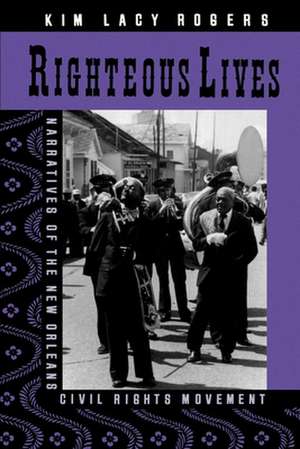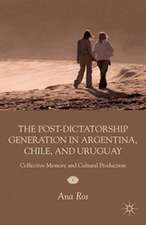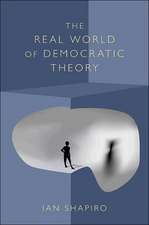Righteous Lives – Narratives of the New Orleans Civil Rights Movement
Autor Kim Lacy Rogersen Limba Engleză Paperback – 31 dec 1994
-- George Lipsitz, University of California, San Diego When former Ku Klux Klan Grand Wizard David Duke campaigned for governor in late 1991, race relations in Louisiana were thrust dramatically into the national spotlight. New Orleans, the political and economic hub of the state, is in many ways representative of Louisiana's unique racial mix, a fusion of African-American, Caribbean, European, and white Southern cultures. An old, colorful port famous for its French and Spanish heritage, distinctive architecture, and jazz, New Orleans was a peculiarly segregated city in the 1950s and 1960s. Yet, despite its complicated racial and ethnic identity and heated desegregation battles, New Orleans, unlike other Southern cities such as Birmingham, did not explode.
In this moving work, Kim Rogers tells the stories, in their own words, of the New Orleans' civil rights workers who fought to deter the racial terrorism that scarred much of the South in the 1950s and 1960s. Spanning three generations of activists, RIGHTEOUS LIVES traces the risks, triumphs, and disappointments that characterized the lives of New Orleans activists. Chronicling watershed moments in the movement, Rogers' compelling narrative illustrates how blacks and whites worked together to decompress the tensions that accompanied desegregation in the ethnic mosaic of New Orleans.
Preț: 229.17 lei
Nou
Puncte Express: 344
Preț estimativ în valută:
43.86€ • 45.20$ • 37.03£
43.86€ • 45.20$ • 37.03£
Carte tipărită la comandă
Livrare economică 03-17 martie
Preluare comenzi: 021 569.72.76
Specificații
ISBN-13: 9780814774564
ISBN-10: 0814774563
Pagini: 292
Dimensiuni: 153 x 228 x 21 mm
Greutate: 0.45 kg
Ediția:New.
Editura: MI – New York University
ISBN-10: 0814774563
Pagini: 292
Dimensiuni: 153 x 228 x 21 mm
Greutate: 0.45 kg
Ediția:New.
Editura: MI – New York University
Recenzii
"Rogers paints a slightly less rosy picture, one in which the Louisiana un-American Activities Committee staged a raid on the offices of the Southern Conference Educational Fund (SCEF), and the City Council passed laws prohibiting the right to peaceful assembly, paving the way to jailing protesters."
Gambit Weekly This important study provides fresh insights into the lives of both black and white civil rights leaders, documents the diversity of individuals and motivations, and traces movement history in a major southern city. Well written and well researched, this book is highly recommended for readers at all levels.
--Choice Charts the distinctly different experiences and memories of 25 black and white civil rights activists of three 'generations' in New Orleans, opening with a deft sketch of the city's unusual racial background with its black Creole caste.
--Publishers Weekly An important study, full of valuable information, profoundly moving testimony, and provocative insights.
--The Journal of Southern History "An emotionally evocative, richly textured history based on autobiographical accounts of those who lived and shaped the struggle. The importance of many of Rogers' subjects and the uniqueness of New Orleans make this must reading for anyone interested in the history of the movement. But those interested in oral history and African-American autobiography will find riches aplenty as well. A welcome addition to a number of literatures"
--Doug McAdam, author of Freedom Summer "Righteous Lives skillfully blends oral history with a perceptive analysis of three generations of civil rights leadership in New Orleans. Rogers has revealed not only what people did, but what they remember, and how their assessments of their activism have changed over time."
--Donald A. Ritchie, U.S. Senate Historical Office
"Rogers paints a slightly less rosy picture, one in which the Louisiana un-American Activities Committee staged a raid on the offices of the Southern Conference Educational Fund (SCEF), and the City Council passed laws prohibiting the right to peaceful assembly, paving the way to jailing protesters." --Gambit Weekly This important study provides fresh insights into the lives of both black and white civil rights leaders, documents the diversity of individuals and motivations, and traces movement history in a major southern city. Well written and well researched, this book is highly recommended for readers at all levels. --Choice Charts the distinctly different experiences and memories of 25 black and white civil rights activists of three 'generations' in New Orleans, opening with a deft sketch of the city's unusual racial background with its black Creole caste. --Publishers Weekly An important study, full of valuable information, profoundly moving testimony, and provocative insights. --The Journal of Southern History "An emotionally evocative, richly textured history based on autobiographical accounts of those who lived and shaped the struggle. The importance of many of Rogers' subjects and the uniqueness of New Orleans make this must reading for anyone interested in the history of the movement. But those interested in oral history and African-American autobiography will find riches aplenty as well. A welcome addition to a number of literatures" --Doug McAdam, author of Freedom Summer "Righteous Lives skillfully blends oral history with a perceptive analysis of three generations of civil rights leadership in New Orleans. Rogers has revealed not only what people did, but what they remember, and how their assessments of their activism have changed over time." --Donald A. Ritchie, U.S. Senate Historical Office
Gambit Weekly This important study provides fresh insights into the lives of both black and white civil rights leaders, documents the diversity of individuals and motivations, and traces movement history in a major southern city. Well written and well researched, this book is highly recommended for readers at all levels.
--Choice Charts the distinctly different experiences and memories of 25 black and white civil rights activists of three 'generations' in New Orleans, opening with a deft sketch of the city's unusual racial background with its black Creole caste.
--Publishers Weekly An important study, full of valuable information, profoundly moving testimony, and provocative insights.
--The Journal of Southern History "An emotionally evocative, richly textured history based on autobiographical accounts of those who lived and shaped the struggle. The importance of many of Rogers' subjects and the uniqueness of New Orleans make this must reading for anyone interested in the history of the movement. But those interested in oral history and African-American autobiography will find riches aplenty as well. A welcome addition to a number of literatures"
--Doug McAdam, author of Freedom Summer "Righteous Lives skillfully blends oral history with a perceptive analysis of three generations of civil rights leadership in New Orleans. Rogers has revealed not only what people did, but what they remember, and how their assessments of their activism have changed over time."
--Donald A. Ritchie, U.S. Senate Historical Office
"Rogers paints a slightly less rosy picture, one in which the Louisiana un-American Activities Committee staged a raid on the offices of the Southern Conference Educational Fund (SCEF), and the City Council passed laws prohibiting the right to peaceful assembly, paving the way to jailing protesters." --Gambit Weekly This important study provides fresh insights into the lives of both black and white civil rights leaders, documents the diversity of individuals and motivations, and traces movement history in a major southern city. Well written and well researched, this book is highly recommended for readers at all levels. --Choice Charts the distinctly different experiences and memories of 25 black and white civil rights activists of three 'generations' in New Orleans, opening with a deft sketch of the city's unusual racial background with its black Creole caste. --Publishers Weekly An important study, full of valuable information, profoundly moving testimony, and provocative insights. --The Journal of Southern History "An emotionally evocative, richly textured history based on autobiographical accounts of those who lived and shaped the struggle. The importance of many of Rogers' subjects and the uniqueness of New Orleans make this must reading for anyone interested in the history of the movement. But those interested in oral history and African-American autobiography will find riches aplenty as well. A welcome addition to a number of literatures" --Doug McAdam, author of Freedom Summer "Righteous Lives skillfully blends oral history with a perceptive analysis of three generations of civil rights leadership in New Orleans. Rogers has revealed not only what people did, but what they remember, and how their assessments of their activism have changed over time." --Donald A. Ritchie, U.S. Senate Historical Office
Textul de pe ultima copertă
When former Ku Klux Klan Grand Wizard David Duke campaigned for governor in late 1991, race relations in Louisiana were thrust dramatically into the national spotlight. New Orleans, the political and economic hub of the state, is in many ways representative of Louisiana's unique racial mix, a fusion of African-American, Caribbean, European, and white Southern cultures. An old, colorful port famous for its French and Spanish heritage, distinctive architecture, and jazz, New Orleans was a peculiarly segregated city in the 1950s and 1960s. Yet, despite its complicated racial and ethnic identity and heated desegregation battles, New Orleans, unlike other Southern cities such as Birmingham, did not explode. In this moving, evocative work, Kim Rogers tells the stories - in their own words - of the New Orleans civil rights workers who fought to deter the racial terrorism that scarred much of the South in the 1950s and 1960s. Spanning three generations of activists, Righteous Lives traces the risks, triumphs, and disappointments that characterized the lives of New Orleans activists. Chronicling watershed moments in the movement, Rogers' compelling narrative illustrates how blacks and whites worked together to decompress the tensions that accompanied desegregation in the ethnic mosaic of New Orleans.









